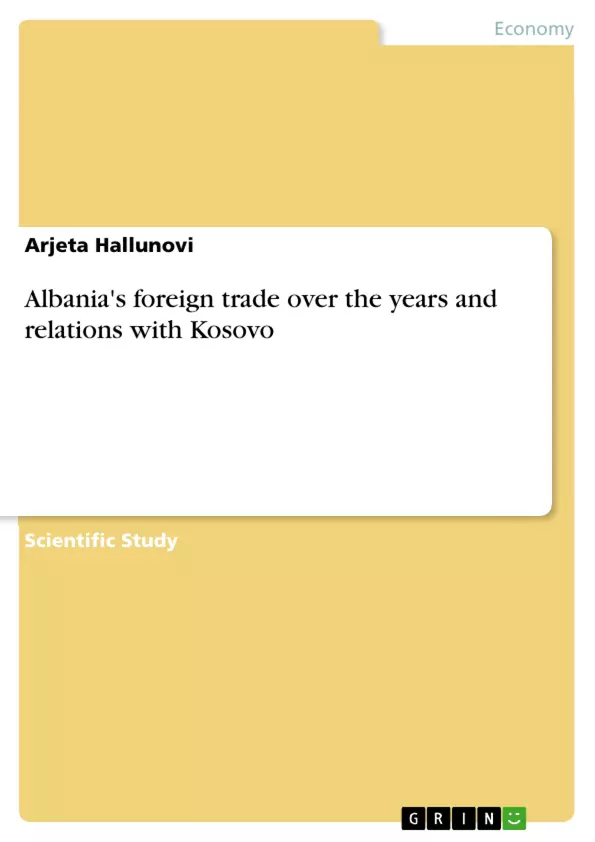The purpose of this study is to give a clear picture of the development of Albania's foreign trade in a long time from the 16th century to the present day. It will also address the features of each period and the most important trade agreements. Given the favorable geographic position Albania has had trade relations with a large number of states but these relations have greatly influenced the policies pursued by our country over the years. Albania's foreign trade liberalization was not an immediate process and act. This process initially started with breaking the state monopoly on foreign trade, which was initiated by the privatization and overall liberalization of the economy, initially from the legal point of view to that of the laws adopted by the democratic parliament, and then gradually being implemented by the side of executive power.
The causes that make international trade cooperation necessary are related to: uneven distribution of production factors, changes in taste and consumption, economies of scale, absolute and realistic output advantages, climate factors, economic and geographical proximity, international transfer technology, international labor migration, and so on. States that transformed their power from communism to democracy faced such economic problems that are solved during the economic transition period. One of them is Albania, which still seems to have been hostage to the transition process. Another important point of this topic will be the relations between Albania and Kosovo.
How did they walk? How would a customs union affect the development between the two countries? Has the development of the nation's path awaited the development of trade relations? How is the level of exports and imports between them? These will be some of the points that will be answered in this study.
Inhaltsverzeichnis (Table of Contents)
- Developing trade from the first trading relationship to the communist era
- The beginnings of foreign trade development in Albania
- Developing foreign trade after the declaration of Independence
- Foreign trade during the years 1920-1944
Zielsetzung und Themenschwerpunkte (Objectives and Key Themes)
This study aims to provide a comprehensive overview of the development of Albania's foreign trade from the 16th century to the present day. It will explore the evolution of trade relations, key trade agreements, and the factors that have shaped Albania's trade policies over time. The study will also examine the historical and contemporary relationship between Albania and Kosovo, including the potential impact of a customs union on their economic development.
- Albania's historical and contemporary foreign trade relations
- The impact of political and economic changes on trade development
- Key trade agreements and their influence on Albanian trade policies
- The relationship between Albania and Kosovo
- The potential impact of a customs union on Albanian-Kosovar economic relations
Zusammenfassung der Kapitel (Chapter Summaries)
- Developing trade from the first trading relationship to the communist era: This chapter explores the early development of foreign trade in Albania, starting with the 16th century and continuing through the communist period. It highlights the influence of major trade routes, the impact of trade agreements with Western powers, and the evolution of trade patterns within the context of Albania's changing political landscape.
Schlüsselwörter (Keywords)
Albania, Foreign Trade, Economic Development, Trade Agreements, Kosovo, Customs Union, Political Transition, Economic Integration.
Frequently Asked Questions
What is the historical scope of this study on Albania's trade?
The study covers the development of Albania's foreign trade from the 16th century through the communist era to the present day.
How did Albania transition from a state monopoly to trade liberalization?
The process involved breaking the state monopoly, privatization, and the adoption of new laws by the democratic parliament during the economic transition.
What are the main factors driving international trade cooperation for Albania?
Key factors include uneven distribution of production, economies of scale, technological transfer, and geographical proximity.
How are the economic relations between Albania and Kosovo described?
The study examines current export/import levels and discusses the potential impact of a customs union between the two countries.
What role did the communist era play in Albania's trade history?
The study analyzes trade patterns during the communist period and the challenges of shifting to a democratic market economy.
- Quote paper
- PhD Arjeta Hallunovi (Author), 2019, Albania's foreign trade over the years and relations with Kosovo, Munich, GRIN Verlag, https://www.grin.com/document/479070



